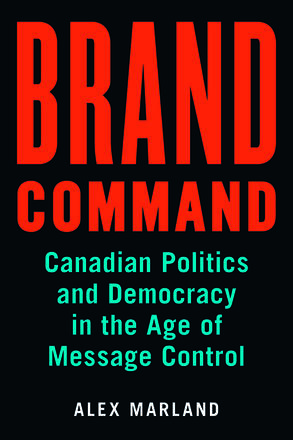
Brand Command
Canadian Politics and Democracy in the Age of Message Control
An eye-opening look at how political parties and the government use branding strategies and the implications that this has for Canadian democracy.
Description
The pursuit of political power is strategic as never before. Ministers, MPs, and candidates parrot the same catchphrases. The public service has become politicized. And decision making is increasingly centralized in the Prime Minister’s Office. What is happening to our democracy? To get to the bottom of this, Alex Marland reviewed internal political party files, media reports, and documents obtained through access to information requests, and interviewed Ottawa insiders. He discovered that in the face of rapid changes in communication technology, the infusion of corporate marketing strategies has instilled a culture of centralized political control. At the core of the strategy is brand control; at stake is democracy as we know it.
Reviews
Much of Marland’s book is focused on how the former Conservative government brought branding and message control to federal politics — and it’s the most complete, revelatory insight to date … Marland flatly warns that branding erodes parliamentary democracy and the book contains a number of suggested ways to keep branding power in check. It doesn’t work well when people are “off message.” Healthy democracy, on the other hand, requires an element of dissent and disagreement. The same is true of the media, which can often be seen by brand-fixated governments as just another arm of the marketing machine.
- Susan Delacourt
This book represents another major contribution to the study of Canadian political communications and marketing by Alex Marland.
- William Wilson, University of Ottawa
The pursuit of political power is more strategic than ever and political parties and governments are using the same brand control as the world’s largest corporations, which does not bode well for democracy, argues Alex Marland in his thought-provoking new book … Mr. Marland, one of the country’s leading experts on marketing and politics … substantially investigates the branding strategy in government and politics today and looks at how it will create serious problems for parliamentary democracy.
- Kate Malloy
Alex Marland’s Brand Command provides us with insightful and profound lessons about how government works behind the scenes. Marland collected and analyzed a wealth of fascinating primary government data to write the book, and as a result, it demonstrates how tightly government can manage its communications, raises questions about how effective centralized systems are, and requires us all to reflect on how (or even if) we can judge whether the practice of political management is acceptable or not for democracy.
- Jennifer Lees-Marshment, University of Auckland, Auckland, New Zealand
Practically every paragraph [of Brand Command] is jam-packed with provocative instances and insightful opinions. Any person who aspires to political participation, or simply to an intelligent grasp of the nuances of modem politics, must read this book.
- Bill Rowe, former politician and author of <em>The Worst and Best of the Premiers and Some We Never Had</em>
Alex Marland has written a tour de force on message control in government and party communications … Beyond this worthy contribution to his field of study, Marland also manages to interweave a synthesis of theoretical perspectives while offering his own original insights into modern government communications and political marketing. In all likelihood, Brand Command will become a standard reference work for those who study this increasingly important aspect of politics and public policy.
- James Bickerton, St. Francis Xavier University